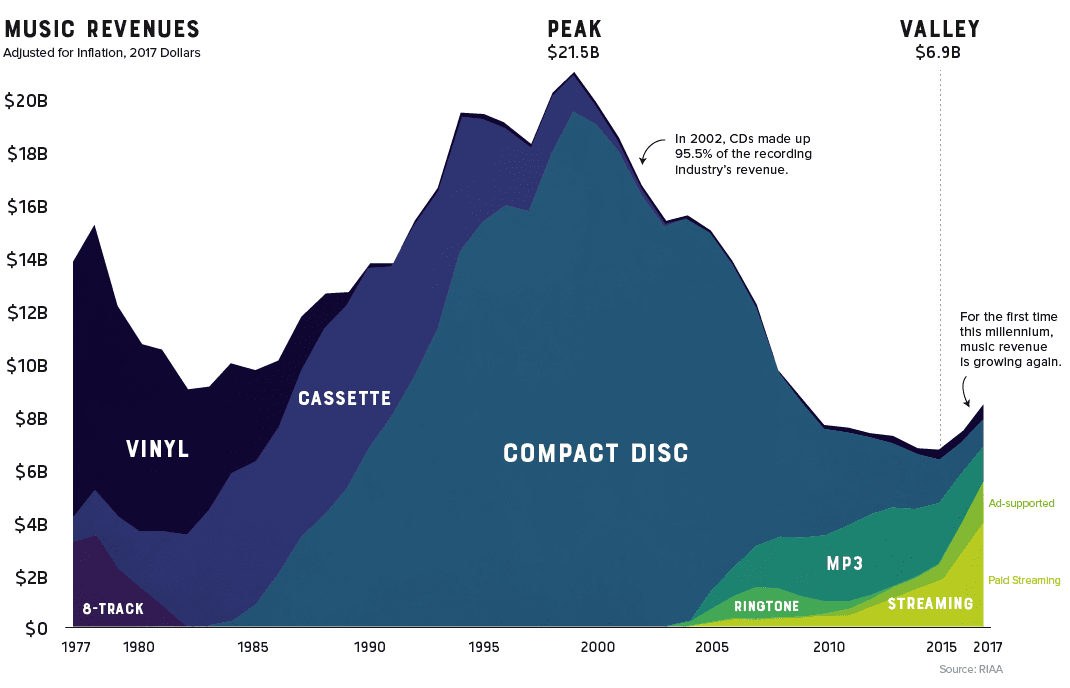The music industry has undergone a significant revolution over the years, thanks to technological advancements. From vinyl records to digital downloads and streaming, the way we consume music has changed dramatically. This article outlines ten ways technology has transformed the music industry, from democratising music production through digital recording, enabling musicians to distribute their music online without record labels or physical stores, to using social media to create wider fan bases and promote music. Additionally, the rise of music videos, the infusion of Auto-tune technology, and virtual reality concerts have transformed the industry. Artificial intelligence, crowdfunding platforms, and streaming services have created new opportunities and changed the way we experience music. The possibilities are endless with technological advancement, and the future of the music industry is bound to be even more exciting.
From Vinyl to Streaming: 10 Ways Technology Has Changed the Music Industry
The music industry has been continuously evolving over the years, thanks to numerous advancements in technology. From vinyl records to cassettes and CDs, and now to streaming services, how we consume music has changed drastically.
Here are ten ways technology has transformed the music industry:
1. Digital Recording
The digital revolution made it easier for musicians to record and produce music, allowing them to create music in the comfort of their homes without requiring expensive studio setups. This has led to a democratization of music production and a more diverse range of sounds and styles.
2. Online Music Distribution
With the rise of the internet, musicians no longer need record labels or physical stores to distribute their music. Online music platforms like iTunes, Spotify, and Soundcloud have become the primary channels for music distribution.
3. Social Media
Social media platforms like Instagram, Twitter, and Facebook have made it easier for artists to connect with their fans and promote their music. Social media algorithms also allow artists to reach wider audiences, helping them build their brand and gain more recognition.
4. Music Videos
Music videos have become an integral part of the music industry, thanks to the rise of MTV and YouTube. Music videos help artists express their creativity visually, making their music more engaging and accessible to audiences worldwide.
5. Auto-Tune
Auto-Tune technology, which was initially developed for correcting pitch in vocals, has transformed the sound of contemporary music. It has become a staple in hip-hop, pop, and electronic music, allowing artists to create futuristic and otherworldly soundscapes.
6. Virtual Reality
Virtual reality technology is transforming the way we experience live music. With VR, fans can now attend virtual concerts and festivals from the comfort of their homes, giving them the closest experience to attending a live event possible.
7. Artificial Intelligence
AI technology has begun revolutionizing the music industry, with software tools that can analyze music data to predict commercial success, enhance songwriting, and even compose music autonomously.
8. Music Production Software
Digital music production software like Ableton Live, Logic Pro, and FL Studio have made it easier for artists to create and produce music without requiring costly studio setups. These tools provide access to an endless range of virtual instruments and sounds, allowing artists to create music without being limited by their physical surroundings.
9. Crowdfunding
Crowdfunding platforms like Kickstarter and IndieGoGo have provided a way for musicians to fund their projects without requiring the support of record labels or investors. This has helped numerous independent artists launch their careers and achieve their dreams.
10. Streaming Services
Streaming services like Spotify and Apple Music have revolutionized how we consume music. With these services, fans can access millions of songs anytime, anywhere, without requiring physical copies of the music. This has led to a decline in CD and vinyl sales and a shift towards digital consumption.
Conclusion
In conclusion, technology has had a tremendous impact on how we create, distribute, and consume music, transforming the music industry into what it is today. As technology continues to evolve, we can expect more innovative tools for music production, distribution, and consumption in the future.
